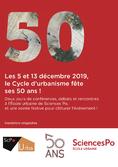sustainability simulation downtowns urban market urbanization democrazia brownfields urban renewal European policies settlements premio letteratura urbanistica waterfronts & harbors rigenerazione urbana public art fragile territories urban policies local plans networks landscape innovation call for articles superplaces conferences resilience welfare
5 December 2019 – 13 December 2019
Le Cycle d'urbanism fête ses 50 ans | École urbaine de Sciences Po
Paris, France
• Ecole Urbaine Sciences Po
In the last fifty years, the CYCLE D’URBANISME of SciencesPo Paris graduated almost 2000 planners and urbanists engaged in "LA FABRIQUE DE LA VILLE". To celebrate this event, the Urban School and the ASSOCIATION SCIENCES PO URBA organize two conférences: on the 5th December, 14:00-18:00 the AESOP lectures; on 13th December 13h30 à 17h30, Le Grand débat.
5 Décembre de 13h45
LES CONFÉRENCES DE L’AESOP
Cities on Earth: the politics and design of spatial development face to the new climatic regime
27 rue Saint Guillaume 75007 Paris - Amphithéâtre Jacques Chapsal
• Marco Cremaschi, Patrick Le Galès, Introduction;
• Bruno Latour, Professeur émérite, Sciences Po, "The new climatic regime";
• Robert Beauregard, professor emeritus, Columbia, "Dwelling with the Earth";
• Anastasia Loukaitou-Sideris, professor of urban planning, UCLA, "Terrestrial Urban Design? Responsibilities and challenges of urban design and spatial planning in the new climatic regime”;
• Yvonne Rydin, chair of planning, environment and public policy, Bartlett School London, "Planning, Provisionality and Learning"
***
13 Décembre de 13h15
LE 50e DU CYCLE
Brave new world : (re)faire la ville, (re)faire les urbanistes
13 rue de l’Université 75007 Paris - Amphithéâtre Jean Moulin
• Marco Cremaschi, Introduction;
• ZAC . / Fabriquer la ville post-carbone, oui mais comment ? Avec Fabienne Keller, député européenne; Marion Waller, directrice adjointe cabinet de Jean-Louis Missika; Charlotte Halpern, chercheuse au CEE de Sciences Po, directrice de l’excutive master Gouvernance territoriale et développement urbain; Stéphane Keïta, président directeur général de la SCET; Jean-Luc Poidevin, directeur général délégué collectivités locales, Nexity, animé par Jérôme Baratier, directeur de l’agence d’urbanisme de Tours ;
• ZAD ? / Fabriquer la ville, oui mais pour qui ? avec Gaëlle Andro, vice-présidente de Rennes Métropole (sous réserve); Adeline Chambe, directrice de l’aménagement, Paris&Métropole Aménagement ; Ido Avissar, architecte-urbaniste, fondateur de l’agence LIST; Mathieu Delorme, ingénieur paysagiste urbaniste, fondateur d’Atelier Georges; Stefania Parigi, directrice de l’Hébergement, Adoma, animé par Marina Gaget, responsable pédagogique du Cycle d’urbanisme;
• ZUT ! / Synthèse par Patrick Bouchain, Grand Prix de l’Urbanisme 2019
The Cycle d'urbanisme de SciencesPo: GRADUATE ADMISSIONS ARE OPEN !
Inscriptions are open to / deadline: 13th January 2020. The Sciences Po Urban Planning programme combines a solid foundation in the social sciences with the acquisition of professional skills: in urban planning: urban design and project management; in urban development: operational requirements and project commissioning; and in real estate. Condensed into three semesters, this intensive, multidisciplinary programme enables students to achieve professional competence in the legal, economic and technical dimensions of urban development and renewal.
A new Master's degree programme at the Urban School of SciencesPo Paris: Governing Ecological Transitions in European Cities
The acute challenges of climate change, “natural” disasters, pollution, access to water and energy, and the maintenance of biodiversity are driving many European cities to rethink the design and implementation of public policies and corporate strategies.
The Governing Ecological Transitions in European Cities Master’s programme prepares students to manage current and future transitions through advanced training in both urban environmental challenges and urban governance. To this end, students learn to: understand cities as socio-ecological systems: metabolisms, non-human actors, natural systems and their multiple interactions with urban policies identify the historical legacies of cities’ environmental issues as well as current developments, with a particular focus on the specificities of European cities analyse the environmental and climate policies of European cities at different scales, and manage sustainable resource use and climate action interact with the wide range of public and private actors involved in urban environmental policy, and with the various forms of environmental assessment and expertise; manage a project; implement a collective initiative, public policy, or corporate strategy ; identify and promote innovation and upscaling in the field of ecological transition.
The new Master's degree programme opening in September 2020. The teachings will be fully in English: https://www.sciencespo.fr/ecole-urbaine/en/governing-ecological-transitions-european-cities.html
New book: RÉPARER LA VILLE, pour un urbanisme des transitions. Les workshops du Cycle à Lampedusa, Salonique, Buenos Aires et Berlin, dir. Jérôme Baratier, Marco Cremaschi
This book is the return trip from a few international workshops , aimed at recomposing these experiences to the practices of urban planning in France and in Europe. From these case-studies, the book recovers a few wider elements which introduce (in a somewhat ambitious way) a renewed way of thinking about urban planning. European urbanism is no longer about building cities: though a glorious and historic mission, it is less and less at the center of urban policies. It's about redoing the city by bits and pieces, over ist traces and imprinting, in a reflective way, questioning its uses and inhabitants.
Organized by Marco Cremaschi
INFO & CONTACTS
Email: marco.cremaschi@sciencespo.fr
Web: https://www.sciencespo.fr/ecole-urbaine/fr/actualites/le-cycle-durbanisme-fete-ses-50-ans.html
Event schedule:
- Start: 12-05-2019
- End: 12-13-2019.
Related articles:




Planum
The Journal of Urbanism
ISSN 1723-0993
owned by
Istituto Nazionale di Urbanistica
published by
Planum Association
ISSN 1723-0993 | Registered at Court of Rome 4/12/2001, num. 514/2001
Web site realized by ChannelWeb & Planum Association | Powered by BEdita 3


